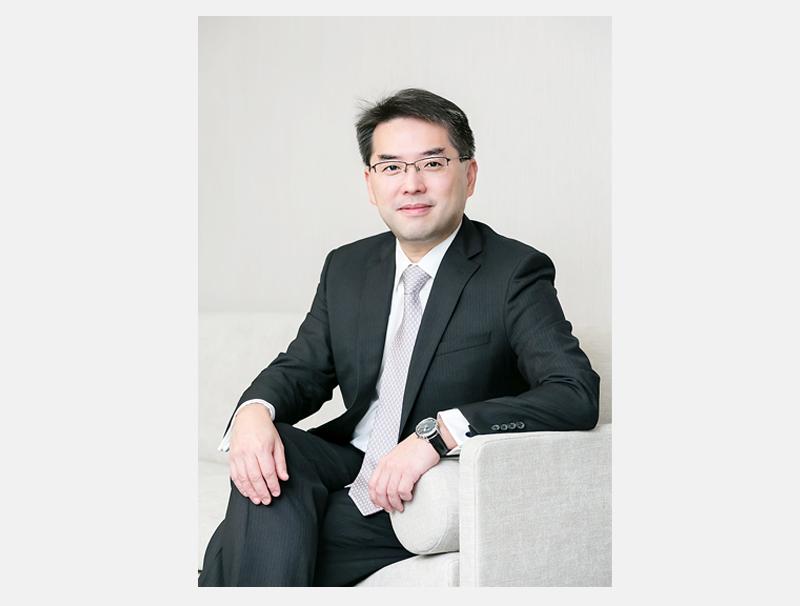Taiwanese companies are on two different paths to recovery, with 16 percent seeing their profits ahead of pre-COVID-19 levels this year, while 71 percent do not expect a full recovery until the end of 2022, HSBC Bank (Taiwan) Ltd (匯豐台灣商銀) said yesterday.
That was based on an HSBC Bank PLC Navigator survey of 10,000 companies in 39 markets conducted from Sept. 11 to Oct. 7, including 200 firms in Taiwan.
Companies in the first group are in the electronics sector, with many of them benefiting from increased demand for consumer electronics because of the work-from-home trend and some receiving big and rush orders in the third quarter, HSBC Taiwan senior vice president Stanley Hsiao (蕭仲程) told a media briefing in Taipei.

Photo courtesy of HSBC Bank (Taiwan) Ltd
Sixteen percent was the highest among all markets surveyed, compared with only 8 percent of businesses globally that said they are more profitable than they were before the outbreak, Hsiao said.
However, overbooking could be an issue next year and it is unlikely that electronic firms would continue to maintain high profit growth, he said.
For companies expecting to return to pre-pandemic levels within the next two years, many of them fall in sectors that have been adversely affected by COVID-19, such as tourism, dining or aviation, he said.
They expect to regain profit momentum on the back of increasing demand, as the pandemic eases with the help of vaccines and technological developments, he said.
They have a higher chance of posting growth next year than electronic firms, but it would be a longer path to a full recovery, he said.
Meanwhile, 70 percent of Taiwanese companies plan to increase their investments, higher than the global average of 67 percent and the Asia-Pacific average of 65 percent, the survey showed.
Some are boosting investments because they are upbeat about the future, while others aim to diversify their supply chains by expanding to Southeast Asia to reduce risks, Hsiao said.
“Overall, businesses in Taiwan have performed better than their global peers, not only because the outbreak has been contained in the nation, but also because Taiwan’s technology-centered economy is more resilient,” he said.
For example, New Zealand has also done well in fighting the virus, but only 6 percent of companies expect their profitability to return to pre-COVID-19 levels by the end of this year, as the country’s agriculture and tourism-based economy is reliant on overseas demand, he said.

Nissan Motor Co has agreed to sell its global headquarters in Yokohama for ¥97 billion (US$630 million) to a group sponsored by Taiwanese autoparts maker Minth Group (敏實集團), as the struggling automaker seeks to shore up its financial position. The acquisition is led by a special purchase company managed by KJR Management Ltd, a Japanese real-estate unit of private equity giant KKR & Co, people familiar with the matter said. KJR said it would act as asset manager together with Mizuho Real Estate Management Co. Nissan is undergoing a broad cost-cutting campaign by eliminating jobs and shuttering plants as it grapples

TEMPORARY TRUCE: China has made concessions to ease rare earth trade controls, among others, while Washington holds fire on a 100% tariff on all Chinese goods China is effectively suspending implementation of additional export controls on rare earth metals and terminating investigations targeting US companies in the semiconductor supply chain, the White House announced. The White House on Saturday issued a fact sheet outlining some details of the trade pact agreed to earlier in the week by US President Donald Trump and Chinese President Xi Jinping (習近平) that aimed to ease tensions between the world’s two largest economies. Under the deal, China is to issue general licenses valid for exports of rare earths, gallium, germanium, antimony and graphite “for the benefit of US end users and their suppliers

Dutch chipmaker Nexperia BV’s China unit yesterday said that it had established sufficient inventories of finished goods and works-in-progress, and that its supply chain remained secure and stable after its parent halted wafer supplies. The Dutch company suspended supplies of wafers to its Chinese assembly plant a week ago, calling it “a direct consequence of the local management’s recent failure to comply with the agreed contractual payment terms,” Reuters reported on Friday last week. Its China unit called Nexperia’s suspension “unilateral” and “extremely irresponsible,” adding that the Dutch parent’s claim about contractual payment was “misleading and highly deceptive,” according to a statement

The Chinese government has issued guidance requiring new data center projects that have received any state funds to only use domestically made artificial intelligence (AI) chips, two sources familiar with the matter told Reuters. In recent weeks, Chinese regulatory authorities have ordered such data centers that are less than 30 percent complete to remove all installed foreign chips, or cancel plans to purchase them, while projects in a more advanced stage would be decided on a case-by-case basis, the sources said. The move could represent one of China’s most aggressive steps yet to eliminate foreign technology from its critical infrastructure amid a